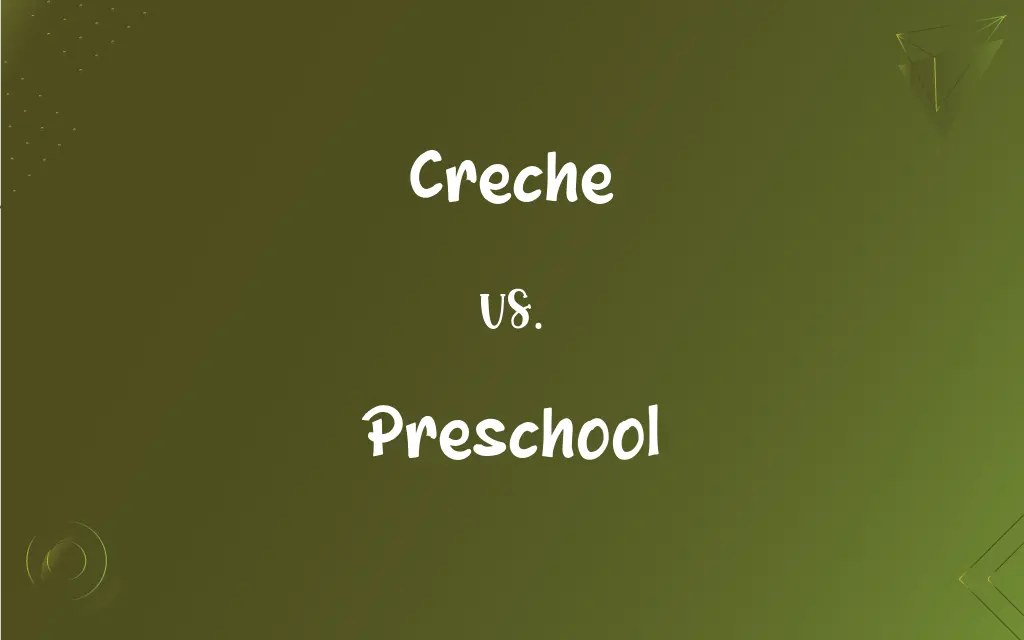Creche vs. Preschool: What's the Difference?
Edited by Aimie Carlson || By Janet White || Published on December 31, 2023
A "creche" is a daycare facility for babies and toddlers, while a "preschool" is an educational establishment for children typically aged 3-5 years, focusing on early learning.

Key Differences
Creches provide care for very young children, primarily focusing on basic needs and play. Preschools, however, cater to slightly older children, offering structured educational programs and activities to prepare them for school.
In a creche, the emphasis is on providing a safe and nurturing environment for infants and toddlers. Preschools emphasize early childhood education, teaching basic skills like numbers, letters, and social interaction.
Creches are suitable for working parents who need childcare for infants. Preschools serve as a foundation for formal education, introducing children to a classroom setting and learning routine.
The staff at creches are trained in childcare, focusing on the physical and emotional needs of young children. Preschool teachers are often trained in early childhood education, focusing on developmental milestones and learning objectives.
Creches operate as daycare centers with flexible hours to accommodate parents' schedules. Preschools usually have set hours and a more structured educational curriculum.
ADVERTISEMENT
Comparison Chart
Age Group
Infants and toddlers.
Children typically aged 3-5 years.
Primary Focus
Childcare and basic needs.
Early learning and education.
Environment
Safe, nurturing daycare.
Structured educational setting.
Staff Training
Childcare and basic development.
Early childhood education.
Operation Hours
Flexible to accommodate parents.
Set hours with a learning schedule.
ADVERTISEMENT
Creche and Preschool Definitions
Creche
A daycare facility for babies and toddlers.
She dropped her baby off at the creche before work.
Preschool
A school for children usually between 3 and 5 years of age.
The preschool focuses on social and cognitive skills.
Creche
A place providing temporary care for small children.
The shopping center offers a creche service for shoppers.
Preschool
An educational establishment for young children before they begin compulsory education.
He learned his ABCs at preschool.
Creche
An establishment offering childcare services.
Their local creche has excellent facilities for toddlers.
Preschool
A place where children learn through play and structured activities.
Her daughter loves the art activities at preschool.
Creche
A nursery where young children are cared for during the day.
The office building has a creche for its employees' children.
Preschool
An early childhood educational environment.
Preschool prepares children for the transition to elementary school.
Creche
A safe environment for infants while parents are occupied.
The creche provides peace of mind to busy parents.
Preschool
A program designed to develop preschool-aged children's skills.
The preschool curriculum includes basic math and reading.
Creche
A representation of the Nativity, usually with statues or figurines.
Preschool
Of, relating to, intended for, or being the early years of childhood that precede the beginning of elementary school.
Creche
A hospital for foundlings.
Preschool
A school for children who are not old enough to attend kindergarten; a nursery school.
Preschool
Of or relating to the years of early childhood before attendance at primary school.
Preschool
A nursery school.
Preschool
(transitive) To provide nursery school education for.
Preschool
(intransitive) To undergo nursery school education.
Preschool
An educational institution for children too young for elementary school
FAQs
What is the main purpose of a preschool?
Preschools focus on early learning and preparation for formal education.
Can preschool help with school readiness?
Yes, preschools are designed to prepare children for school.
What age group is a creche for?
Creches cater to infants and toddlers, usually under 3 years old.
Do creches provide educational activities?
Creches mainly provide care and play, with some basic developmental activities.
Is preschool mandatory?
Preschool is not mandatory but is highly recommended for early development.
Do preschools have a structured curriculum?
Yes, preschools typically have a structured curriculum for early education.
What skills are taught in preschool?
Preschools teach social, cognitive, and basic academic skills.
What kind of staff works at a creche?
Creches employ staff trained in childcare and infant development.
Are meals provided in creches?
Many creches provide meals and snacks for the children.
What is the difference in cost between creche and preschool?
Costs vary, but preschools may be more expensive due to their educational components.
Are parents involved in creche activities?
Parental involvement in creches varies depending on the facility.
How do creches handle children's health care needs?
Creches have protocols for basic health care and emergencies.
Is the transition from preschool to kindergarten easier?
Yes, preschools help children adapt to structured learning, easing the transition to kindergarten.
What are the hours of operation for a creche?
Creches often have flexible hours to accommodate parents' schedules.
Do preschools have outdoor play areas?
Most preschools have outdoor areas for play and learning.
Are preschool teachers certified?
Most preschool teachers have certifications in early childhood education.
What is the teacher-to-child ratio in preschools?
Preschools typically have a lower teacher-to-child ratio for better learning.
Do creches follow a daily schedule?
Creches have a routine but with more flexibility than preschools.
Can a child go from creche directly to kindergarten?
Usually, children move from creche to preschool before kindergarten.
Do preschools offer nap times?
Yes, preschools often include nap times in their daily schedule.
About Author
Written by
Janet WhiteJanet White has been an esteemed writer and blogger for Difference Wiki. Holding a Master's degree in Science and Medical Journalism from the prestigious Boston University, she has consistently demonstrated her expertise and passion for her field. When she's not immersed in her work, Janet relishes her time exercising, delving into a good book, and cherishing moments with friends and family.
Edited by
Aimie CarlsonAimie Carlson, holding a master's degree in English literature, is a fervent English language enthusiast. She lends her writing talents to Difference Wiki, a prominent website that specializes in comparisons, offering readers insightful analyses that both captivate and inform.






































































